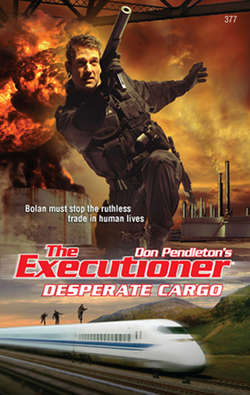Читать книгу Desperate Cargo - Don Pendleton - Страница 7
Prologue
ОглавлениеDuring its long, slow voyage from Thailand, the Orient Venturer made a number of calls into friendly ports. Sometimes it was to take on more cargo, or to unload. It refueled and during those stays in port the captain played host to officials who marked his cargo as legitimate and departed the ship with considerably more cash in their pockets than they’d had when they boarded.
The Orient Venturer’s voyage was one it had made a number of times. In its hold, or in the steel seagoing containers secured to its rusting and scarred deck plates, it carried the mixed cargo that marked it as a ship of all trades. The cargo—mainly clothing and electrical goods, manufactured in Asian sweatshops—would find its way into stores and retail outlets spread across Europe. Cheaply made, the goods would be sold at marked-up prices for Western consumers. These items brought a fair profit for the company that owned the ship.
One container, however, held cargo that would net an even greater profit for the men behind the Orient Venturer.
The special cargo was stowed in a special container. A close inspection would have shown that the container had been altered to facilitate its cargo.
In the roof were a number of vented grilles to allow air to travel in and out of the steel box. This was necessary in order to keep the cargo of young Thai women and children alive.
The eldest woman was twenty-two, the youngest twelve. They were all kidnap victims, intended for sale when they reached their destination. They had no choice in the matter because they were virtual slaves. They’d been stolen from their homes for induction into the twilight world of human trafficking. At journey’s end they would be passed along to their new masters. Some would be forced into the garment industry where they would work endless hours for starvation wages. Others would be moved into prostitution, the sex industry, or they would go as personal playthings for wealthy clients. The younger and prettier a girl, the more likely she would be bought for sexual gratification.
Business was thriving. The Orient Venturer made regular trips delivering the cargo to mainland Europe and the United Kingdom. The men behind the business were based in Rotterdam and London. The organization conducted business globally, procuring assets for clients in the Middle East and the United States. It was well run, protected because of weak legislation and the inability of legal forces to act without absolute and watertight cases. One slip, one word or phrase, on a document, and the whole case could be thrown out of court. Proof positive was almost an impossibility, and although a dedicated effort was being made, no indictments had yet been achieved. Government task forces working together had their hands tied. They struggled for months to concentrate their investigations only to find that their superiors, sensitive to the demands of the courts, would shake their heads and demand even more proof.
The task forces looked for ways to gather their evidence and took the decision to insert undercover agents into the organization in an effort to obtain what they needed.
Dean Turner and Ron Bentley were seasoned agents, working for the joint task force. When they had been asked to take on a covert assignment to infiltrate the trafficking group in Rotterdam they didn’t need to be asked twice. Once assigned they distanced themselves from the main group, setting themselves up to watch suspected members of the trafficking organization. Over a couple of months they concentrated on the Rotterdam group, looking for any members who seemed to be vulnerable to turning, and finally fixed on a single individual who expressed some vocal dissatisfaction with his position within the organization.
The initial contact went well. Their man seemed to have a grievance against his employers and a tendency to complain about them to the American undercover agents. They spent time with him, sympathizing with his complaints, and slowly reeled him into their confidence. In the end he agreed to provide them with evidence that would give the task force solid evidence into the workings of the trafficking group.
However, when the agents made the rendezvous to meet their contact they were ambushed, disarmed and taken to an isolated location.
They were told they were going to be made examples of—used to show the task force that further efforts to break the organization were useless. The traffickers wanted the international task force to know powerful forces ranged against them. The organization had high-profile protection. They could not be touched. No one could harm them. The agents would be used to make the task force realize they were simply wasting their time.
For three days the agents were savagely tortured, their naked bodies abused and broken. Photographs were taken to be sent to the task force and a final message stated where the bodies could be found.
The stark warning, showing the brazen contempt the traffickers had for the task force, had its effect. After the bodies had been located and removed, the task force was ordered to stand back and reassess its operational method. There was a need to regroup—by no means to admit defeat, but the clear message to the task force from the traffickers had got through, and it was realized that the enemy had the upper hand.
